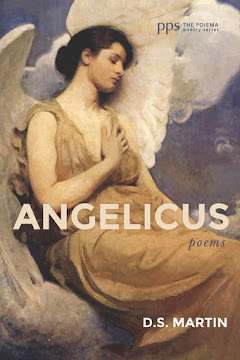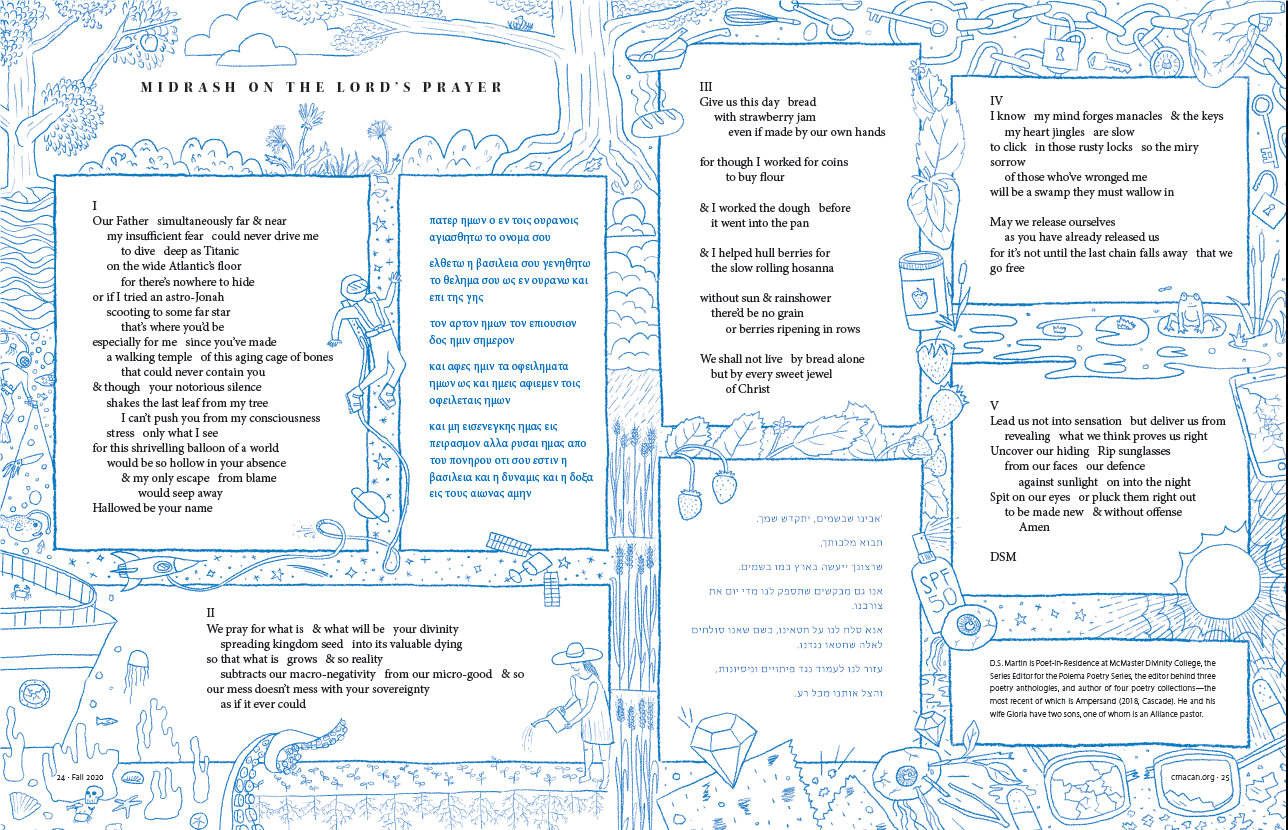Abigail Carroll is the Pastor of Arts and Spiritual Formation with Church at the Well in Burlington, Vermont, and has taught in Boston University’s Writing Program. Her first poetry collection Habitation of Wonder has just been published as part of the Poiema Poetry Series from Cascade Books. I value the experience of having assisted her as editor.
Her previous books include A Gathering of Larks: Letters to Saint Francis from a Modern-Day Pilgrim (2017, Eerdmans) and Three Squares: The Invention of the American Meal (2013, Basic Books). Her writing has appeared in periodicals such as New York Times, Boston Globe, and Wall Street Journal.
The following is from Habitation of Wonder (2018, Cascade Books).
That I Might Dwell
That I might dwell in warbler
song, in fields of sorrel, fields
of stars, that dwelling in your
house I’d know, I’d rest, I’d play
at wonder. Oh that I might dwell
in pine-branched shade, among
the sway, among the praise of oak-
fern, granite, jay nest, spruce—
among the shadow-dance of leaves,
the breeze unpinning doubt, all
apathy, all hollow hours, all fears.
Oh may I dwell in reverence here,
and dwelling in your house, I’ll
wait, I’ll pray, I’ll lay this body
down on what you’ve dreamed,
on what you’ve sung, spliced, spun,
twined, embroidered, breathed.
And dwelling in your house I’ll
know the peace of moss, the moth-
winged hush of unhinged awe,
musk of sage, gaze of deer. Oh let
me lose myself in rooms of fox-
glove, cowslip, wild plum, wren—
that I might taste the sleep of loam,
that I might tenant beauty here.
Posted with permission of the poet.
This is the first Kingdom Poets post about Abigail Carroll: second post.
Entry written by D.S. Martin. His latest poetry collection is Conspiracy of Light: Poems Inspired by the Legacy of C.S. Lewis. His books are available through Amazon, and Wipf & Stock including the anthologies The Turning Aside, and Adam, Eve, & the Riders of the Apocalypse.
Monday, January 29, 2018
Monday, January 22, 2018
Torquato Tasso
Torquato Tasso (1544—1595) is an Italian epic poet, born in Sorrento. His greatest achievement is Gerusalemme Liberata (Jerusalem Delivered), his imagined version of the first Crusade and the Liberation of Jerusalem (1099), which was first published in 1581. Prior to the rise of modernism in the twentieth century, Tasso was one of Europe’s most widely-read poets. The poem was influential for epic poets including Spenser and Milton.
It is hard to see the Crusades as anything more than a political war, justified and encouraged using religious ideals — and hard to relate to the glorification of the Crusades by a Catholic poet 500 years later. Tasso, however, saw this as a fitting subject. As can be seen in the following excerpt from the poem, one motivation for the crusades was to gain access to the pilgrimage site of Christ’s empty tomb. This pilgrimage was not only seen as an act of devotion, but also supposedly as a formal expiation from serious sin, perhaps even prescribed by a confessor.
The following is from Anthony M. Esolen’s translation which appeared in 2000.
From Jerusalem Delivered
Canto 1 — Stanza 23
“Rather it was the target of our hopes
To storm the noble walls of Sion, seize
Our fellow Christians from their shameful yoke,
The bitter slavery and indignities,
To establish a new realm in Palestine
Where piety should hold perpetual lease,
Where no one would prevent the pilgrim from
Fulfilling his vow to adore the Savior’s tomb.”
This post was suggested by my friend Burl Horniachek.
Entry written by D.S. Martin. His latest poetry collection is Conspiracy of Light: Poems Inspired by the Legacy of C.S. Lewis. His books are available through Amazon, and Wipf & Stock including the anthologies The Turning Aside, and Adam, Eve, & the Riders of the Apocalypse.
It is hard to see the Crusades as anything more than a political war, justified and encouraged using religious ideals — and hard to relate to the glorification of the Crusades by a Catholic poet 500 years later. Tasso, however, saw this as a fitting subject. As can be seen in the following excerpt from the poem, one motivation for the crusades was to gain access to the pilgrimage site of Christ’s empty tomb. This pilgrimage was not only seen as an act of devotion, but also supposedly as a formal expiation from serious sin, perhaps even prescribed by a confessor.
The following is from Anthony M. Esolen’s translation which appeared in 2000.
From Jerusalem Delivered
Canto 1 — Stanza 23
“Rather it was the target of our hopes
To storm the noble walls of Sion, seize
Our fellow Christians from their shameful yoke,
The bitter slavery and indignities,
To establish a new realm in Palestine
Where piety should hold perpetual lease,
Where no one would prevent the pilgrim from
Fulfilling his vow to adore the Savior’s tomb.”
This post was suggested by my friend Burl Horniachek.
Entry written by D.S. Martin. His latest poetry collection is Conspiracy of Light: Poems Inspired by the Legacy of C.S. Lewis. His books are available through Amazon, and Wipf & Stock including the anthologies The Turning Aside, and Adam, Eve, & the Riders of the Apocalypse.
Monday, January 15, 2018
Nathaniel Lee Hansen
Nathaniel Lee Hansen, originally from Minnesota, is an assistant professor of English and Creative Writing at the University of Mary Hardin-Baylor in Belton, Texas. He is the author of the new poetry collection, Your Twenty-First Century Prayer Life, which I assisted with as the editor of the Poiema Poetry Series. He has also published the chapbook, Four Seasons West of the 95th Meridian (2014) from Spoon River Poetry Press.
He contributes to the literary dialogue by writing reviews, such as of Tania Runyan's Second Sky for The Cresset, and Benjamin Myers' Lapse Americana for Christianity & Literature. Along with his teaching role at Hardin-Baylor, Hansen edits the journal Windhover, and is the director of the annual Windhover Writers' Festival.
Your Twenty-First Century Prayer Life
Your most frequent requests:
300 safe interstate miles,
night of sufficient sleep, a liner
sturdy for the class’s ocean.
Names you speak again, again—
bless Andrew, bless Lynne.
You wonder how saints
master discipline, currents
of communication in crackling
lines, sparking from sender
to receiver, back again.
You can count on one hand
when prayer blossomed
organically without desire’s
weeds crowding petals,
stealing sunlight, robbing
soil of water and life.
Your petitions persist,
abundant (overflowing)
with me, my, and I.
You forget, if you want
to live you must lose
your life.
Posted with permission of the poet.
Entry written by D.S. Martin. His latest poetry collection is Conspiracy of Light: Poems Inspired by the Legacy of C.S. Lewis. His books are available through Amazon, and Wipf & Stock including the anthologies The Turning Aside, and Adam, Eve, & the Riders of the Apocalypse.
He contributes to the literary dialogue by writing reviews, such as of Tania Runyan's Second Sky for The Cresset, and Benjamin Myers' Lapse Americana for Christianity & Literature. Along with his teaching role at Hardin-Baylor, Hansen edits the journal Windhover, and is the director of the annual Windhover Writers' Festival.
Your Twenty-First Century Prayer Life
Your most frequent requests:
300 safe interstate miles,
night of sufficient sleep, a liner
sturdy for the class’s ocean.
Names you speak again, again—
bless Andrew, bless Lynne.
You wonder how saints
master discipline, currents
of communication in crackling
lines, sparking from sender
to receiver, back again.
You can count on one hand
when prayer blossomed
organically without desire’s
weeds crowding petals,
stealing sunlight, robbing
soil of water and life.
Your petitions persist,
abundant (overflowing)
with me, my, and I.
You forget, if you want
to live you must lose
your life.
Posted with permission of the poet.
Entry written by D.S. Martin. His latest poetry collection is Conspiracy of Light: Poems Inspired by the Legacy of C.S. Lewis. His books are available through Amazon, and Wipf & Stock including the anthologies The Turning Aside, and Adam, Eve, & the Riders of the Apocalypse.
Monday, January 8, 2018
Max Jacob
Max Jacob (1876—1944) is a French poet, artist and critic of Jewish background. He befriended Pablo Picasso in the summer of 1901, when the painter first arrived in Paris; he helped him learn French, and eventually the two roomed together in the Montmartre district.
In 1909 he experienced a vision of Christ and became a Catholic Christian. In 1921 Picasso represents Jacob as a monk in his painting, Three Musicians, because he had decided to enter a monastery.
He was arrested by the Gestapo in 1944. Jacob’s brother and sister were both gassed at Auschwitz, whereas Jacob died in an infirmary, apparently from bronchial pneumonia.
The following is from The Selected Poems of Max Jacob, translated by William Kulik.
Death
----------The body cold and stiff in the morgue of the
world who will give its life back so it may leave?
----------The morgue mountain is on my body who will
free its life so it may leave?
----------Eyes advance like a cloud of bees the eyes of
Argus or the lamb of the Apocalypse.
----------The cloud has thawed my body’s morgue. A
Place, understand me, for the sweet coming of the Lord.
----------Finally, the body’s little more than a faint out-
line the eyes of the cloud gone too.
----------What’s left barely the size of a steak: a blood-
stain, some bits of marble in memory of a lost name.
This post was suggested by my friend Burl Horniachek.
Entry written by D.S. Martin. His latest poetry collection is Conspiracy of Light: Poems Inspired by the Legacy of C.S. Lewis. His books are available through Amazon, and Wipf & Stock including the anthologies The Turning Aside, and Adam, Eve, & the Riders of the Apocalypse.
In 1909 he experienced a vision of Christ and became a Catholic Christian. In 1921 Picasso represents Jacob as a monk in his painting, Three Musicians, because he had decided to enter a monastery.
He was arrested by the Gestapo in 1944. Jacob’s brother and sister were both gassed at Auschwitz, whereas Jacob died in an infirmary, apparently from bronchial pneumonia.
The following is from The Selected Poems of Max Jacob, translated by William Kulik.
Death
----------The body cold and stiff in the morgue of the
world who will give its life back so it may leave?
----------The morgue mountain is on my body who will
free its life so it may leave?
----------Eyes advance like a cloud of bees the eyes of
Argus or the lamb of the Apocalypse.
----------The cloud has thawed my body’s morgue. A
Place, understand me, for the sweet coming of the Lord.
----------Finally, the body’s little more than a faint out-
line the eyes of the cloud gone too.
----------What’s left barely the size of a steak: a blood-
stain, some bits of marble in memory of a lost name.
This post was suggested by my friend Burl Horniachek.
Entry written by D.S. Martin. His latest poetry collection is Conspiracy of Light: Poems Inspired by the Legacy of C.S. Lewis. His books are available through Amazon, and Wipf & Stock including the anthologies The Turning Aside, and Adam, Eve, & the Riders of the Apocalypse.
Monday, January 1, 2018
Denise Levertov*
Denise Levertov (1923—1997) is a British-born American poet who authored more than two dozen collections, including The Collected Poems of Denise Levertov (2013, New Directions). She is considered one of the Black Mountain poets — along with Robert Creeley, Edward Dorn and Robert Duncan — because her early work appeared in the Black Mountain Review.
Becoming a political activist, Levertov was outspoken in opposition to the Vietnam War. She served as Poetry Editor of The Nation in the early '60s, and of Mother Jones in the 1970s. She also taught at various schools, including Stanford University.
Levertov had considered herself to be an agnostic, even though her father as a Hasidic Jew had converted to Christianity, and had become an Anglican priest. She often wrote on religious themes — taking a long, circuitous route to faith — eventually declaring her own conversion in 1984.
For the New Year, 1981
I have a small grain of hope—
one small crystal that gleams
clear colors out of transparency.
I need more.
I break off a fragment
to send you.
Please take
this grain of a grain of hope
so that mine won’t shrink.
Please share your fragment
so that yours will grow.
Only so, by division,
will hope increase,
like a clump of irises, which will cease to flower
unless you distribute
the clustered roots, unlikely source—
clumsy and earth-covered—
of grace.
*This is the third Kingdom Poets post about Denise Levertov: first post, second post, fourth post.
Entry written by D.S. Martin. His latest poetry collection is Conspiracy of Light: Poems Inspired by the Legacy of C.S. Lewis. His books are available through Amazon, and Wipf & Stock including the anthologies The Turning Aside, and Adam, Eve, & the Riders of the Apocalypse.
Becoming a political activist, Levertov was outspoken in opposition to the Vietnam War. She served as Poetry Editor of The Nation in the early '60s, and of Mother Jones in the 1970s. She also taught at various schools, including Stanford University.
Levertov had considered herself to be an agnostic, even though her father as a Hasidic Jew had converted to Christianity, and had become an Anglican priest. She often wrote on religious themes — taking a long, circuitous route to faith — eventually declaring her own conversion in 1984.
For the New Year, 1981
I have a small grain of hope—
one small crystal that gleams
clear colors out of transparency.
I need more.
I break off a fragment
to send you.
Please take
this grain of a grain of hope
so that mine won’t shrink.
Please share your fragment
so that yours will grow.
Only so, by division,
will hope increase,
like a clump of irises, which will cease to flower
unless you distribute
the clustered roots, unlikely source—
clumsy and earth-covered—
of grace.
*This is the third Kingdom Poets post about Denise Levertov: first post, second post, fourth post.
Entry written by D.S. Martin. His latest poetry collection is Conspiracy of Light: Poems Inspired by the Legacy of C.S. Lewis. His books are available through Amazon, and Wipf & Stock including the anthologies The Turning Aside, and Adam, Eve, & the Riders of the Apocalypse.
Subscribe to:
Posts (Atom)
























